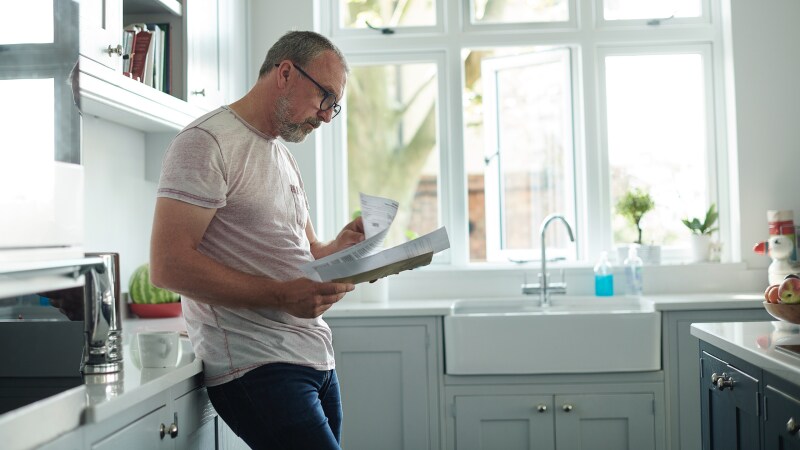6 considerations before selling your home

Selling your home is a big step; there’s a lot to consider before jumping in. Whether this is the first or you’re a selling pro, it never hurts to plan ahead. We've highlighted six things to think about before deciding to sell your home.
1. Paperwork
Buyers will have questions about your house — like how old your roof is — and you'll need to have answers ready. If you seem uncertain or can't respond quickly, you may appear untrustworthy. Avoid this by putting your house on the market after your paperwork is together. Here are some things you'll need:
- Original sales contract
- Mortgage documents and outstanding balance
- Homeowners association documents
- Homeowners insurance records
- Age, warranty paperwork and instruction manuals for furnace, central air, hot water heater and other appliances
- Roof age and warranty paperwork
- Dates of home improvements such as window installation, kitchen and bathroom remodels, and floor repairs
- Permits for sheds, fences or decks
These documents can help you answer questions from potential buyers, and you'll need them when you close. Mandatory disclosures vary by state, and if you fail to disclose this information you could be held liable.
2. Real estate agent
While it’s possible to sell your house without a real estate agent, you may decide their expertise is worth the cost.
For sale by owner
If you choose to sell your home on your own you won't have to pay an agent's commission, which is usually 6% of the purchase price. You'll also be able to focus your full attention on it while an agent will have other clients vying for their time. And if your house is on a busy road or in a neighborhood where other houses are for sale by real estate agents, you won't have to do much advertising to get the attention of interested buyers. A simple "for sale by owner" may be all you need.
With the help of a real estate agent
Agents know the market in various locations, so they’re able to recommend a competitive listing price, know how to market to the right buyers and negotiate based on hard facts about your home. They also field calls from interested buyers, which can take up a lot of time. Agents can help make sure interested buyers are qualified, and have safeguards in place to protect themselves and their clients against criminals posing as buyers.
3. Time to sell
Timing is everything, so pay attention to real estate trends in your neighborhood. Some locations are poised for growth and selling prices may go up over the next few years. If you live in one of these areas, you may want to hold out for a higher listing price. The same can be true in reverse. If property values are trending down in your neighborhood, it may be best to sell sooner rather than later.
It’s also important to consider the season when selling. Putting your house on the market during the right season can maximize your profits and cut down on the stress of waiting for a buyer.
Spring
Spring is the prime selling season in many areas. Tax refunds have arrived, the school year is ending soon and the warmer weather inspires people to make changes. Other sellers may know that spring is the best time for the market, too, so you might have more competition if you live in a densely populated area.
Summer
Buyers slow down when the weather heats up, but it's still a good time to list your house for the same reasons that were true in the spring. Families are more mobile during these two seasons with the kids out of school, but they take vacations during this time which may cause a slight slowdown in home purchases.
Fall
With winter approaching in colder climates, prospective buyers won't be as active. Be prepared to wait a little longer for offers.
Winter
Winter is generally the slowest homebuying season. But if you live in a region that's warm year round, you may have luck attracting buyers looking to escape the cold weather. Markets in these climates tend to be more active throughout the year.
4. Preparing your house
If you're planning to sell in the spring, start getting your house ready in the winter. Potential buyers often decide if they like a house within moments of seeing it, so give yourself enough time to prep before listing.
The nicer your house looks, the more buyers will want it. The key is to help them envision themselves living there. To do that, remove personal items like pictures, pet supplies and toys. And while you may love bold colors, it’s a good idea to have neutral walls and flooring. Don’t forget to clean your house from top to bottom, and correct any home maintenance issues before your first showing. Since the outside of your home is the first thing a potential buyer sees, make a good impression by maintaining your lawn and keeping any landscaping neat.
Some real estate agents will want to stage your house for pictures and showings, which means they'll rearrange rooms to make them look their best. It's not uncommon for furniture to be rented for the staging while the seller puts theirs into storage. This may not work for everyone, especially if you have kids or pets, and isn't required.
Make sure only family members necessary to conduct the showing are there when potential buyers see the home. The fewer people they see, the less distracted and more comfortable they'll be.
5. Home inspection
It's normal for a buyer to have a home inspected before closing, but it should be just as common for sellers to get one before listing their home. Although it can cost a few hundred dollars, it could save you money in the future. The inspector will look over several things including the foundation and structure, electrical, plumbing and heating and cooling systems, as well as the roof, walls and floors. You’ll get a report highlighting issues that may affect the home’s structural integrity or an occupant's health or safety.
6. Potentially renting
Maybe you aren't ready to sell your home just yet. If you're on the fence, you have the option to rent it instead. But know that renting comes with its own challenges.
The minimum goal for renting is to cover your property expenses: mortgage, insurance, taxes, upkeep and repairs. Ideally, your rent would cover these with some profit on top, but some of your rental income should be set aside to pay bills when you don't have a renter. Hiring a property manager may be helpful. They can oversee repairs, cleaning and advertising when your home is empty, and collect rent.
Selling your home is a personal decision that shouldn't be taken lightly. It can be exciting, but it’s important to do your research and prep your home before putting it on the market.



